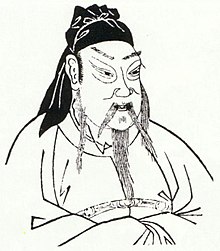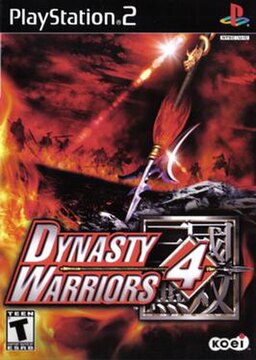I was aware that all the characters and events are based on historical characters and events, but I didn't really know much about them. I'll be honest: I didn't know the difference between the Warring States and the Three Kingdoms periods. (The Warring States was 475-221 BC, the Three Kingdoms was 220-280 AD - about half a millenium apart. To put in perspective, that's roughly the difference between Buddha and Jesus, or between Jesus and Mohammed. But that's irrelevant.)
I started by reading the epic Romance of the Three Kingdoms, on which DW is based. ROTK is a terrifyingly long book - four volumes of really small print. It was written in the Ming Dynasty, some 1400 years after the actual events. (Again, putting it into perspective, that's a similar time gap as in Shakespeare's Julius Caesar and Antony and Cleopatra.)
It's important to realize that ROTK is not a history. It's a novel based on actual events, and it's about as accurate as watching Tarantino's Inglourious Basterds and treating it as a documentary. Author Luo Guanzhong invented characters, changed events, added some bits of mythology, and generally slanted everything to make it into a good story. (If you're interested, here's a list of what he just plain made up - and that doesn't include the bits he dramatized for literary purposes.)
So I then started looking at the real history.
All I can say is that China was, apparently, overrun by total psychopaths for about a century.
What's fascinating is that they all claimed to be adhering to a deep moral code, Confucianism, which is based on loyalty to one's superiors. And yet, they were the most untrustworthy, disloyal, backstabbing and pernicious bastards you can imagine. The entire period is characterized by people turning on their lords and friends, betrayals, deceit, and opportunism. Anything is permissible in the pursuit of power. Today's allies are tomorrow's enemies, and your reward for helping someone is likely to be your own execution.
 |
| Liu Bei: changed sides several times, lost countless battles, and became emperor for two years. |
It's almost impossible to imagine a world where 8 out of every 10 people is dead. Almost all the adult males are gone, and all that's left are women, children, and old people. It's like something out of a post-apocalyptic nightmare.
In fact, it IS a post-apocalyptic nightmare.
 |
| Zhang Fei: drunken killer who murdered his wife and children to prove his loyalty, and lost countless battles - and tens of thousands of troops - through being too inebriated to follow orders. |
Not only were the warlords ruthless with the lives of their men in battle, their personal cruelty and bloodthirstiness was staggering. There are numerous accounts of when one lord would execute another - and would then also kill his entire family, his household, his servants, his retainers, and all their families. Literally thousands of people would be executed. Mass executions of prisoners were commonplace. Scorched earth policies were the norm, even if this left the population with no food and no option but to resort to cannibalism. Even their own families weren't safe from these psychos: apparently Zhang Fei and Guan Yu were so eager to prove that they were completely committed to their attack on another warlord and weren't distracted by thoughts of home that they murdered their own wives and children. In another incident, Liu Bei needs lodgings for the night, but the guy he stays with has no food, so he kills and cooks his wife and daughter. Liu Bei, far from being horrified by this, is impressed with the man's devotion and rewards him handsomely.
 |
| Lu Bu: crazy killer who murdered Ding Yuan, the man he regarded as his adopted father, in order to ingratiate himself with Dong Zhuo. He was then adopted by Dong Zhuo, and Lu Bu murdered him too. |
And those - let me stress - are the so-called good guys. Their opponents, Dong Zhuo, Cao Cao, Lu Bu and others, are just as bad. The only thing they apparently know how to do is to kill and destroy, and they all hope to be the last man standing.
What's really bizarre is that these nutjobs have a strange respect for one another. Time and again, after some calamitous, pointless battle in which tens of thousands of soldiers are killed and maimed, the loser surrenders and is rewarded by the victor, while his defeated army is decapitated en masse. The common people are worthless, but their rulers are treated with godlike reverence. As one of them points out, Confucius says that "the law does not apply to the man of greatness." And then, a short while later, they'll be trying to kill each other again, whether by assassination, poison, or raising more huge armies to start another war.
 |
| Guan Yu: changed sides to fight against his friends. Regarded as the epitome of loyalty, and was deified. He is still worshiped today throughout China. |
I think I'll go and play Final Fantasy instead. Sometimes it doesn't do to read history.




1 comment:
A wonderful post, Matt. I'm fascinated with Chinese history as well. Thanks for some of the back story. I'd laugh at some of your comments if what you were describing wasn't so horrible!
Post a Comment